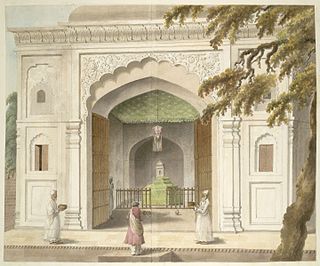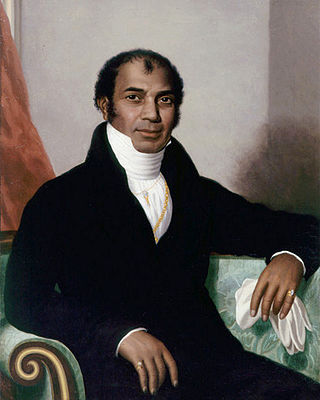Related Research Articles

Awadh, known in British historical texts as Avadh or Oudh, is a historical region in northern India, now constituting the northeastern portion of Uttar Pradesh. It is roughly synonymous with the ancient Kosala region of Hindu, Buddhist, and Jain scriptures.

William Benedict Hamilton-Dalrymple is an India-based liberal Scottish historian and art historian, as well as an activist, curator, broadcaster and critic. He is also one of the co-founders and co-directors of the world's largest writers' festival, the annual Jaipur Literature Festival. He is currently a Visiting Fellow at All Souls College, Oxford.

Rohilkhand is a region in the northwestern part of Uttar Pradesh, India, that is centered on the Bareilly and Moradabad divisions. It is part of the upper Ganges Plain, and is named after the Rohilla tribe of Afghans. The region was called Madhyadesh and Panchala in the Sanskrit epics Mahabharata and Ramayana. During the colonial era in India, the region was governed by the Royal House of Rampur.

A lascar was a sailor or militiaman from the Indian subcontinent, Southeast Asia, the Arab world, British Somaliland or other lands east of the Cape of Good Hope who was employed on European ships from the 16th century until the mid-20th century.

Shuja-ud-Daula was the third Nawab of Oudh and the Vizier of Delhi from 5 October 1754 to 26 January 1775.

Dean Mahomed (1759–1851) was a British Indian traveller, soldier, surgeon, entrepreneur, and one of the most notable early non-European immigrants to the Western World. Due to non-standard transliteration, his name is spelled in various ways. His high social status meant that he later adopted the honorific "Sake" meaning "venerable one". Mahomed introduced Indian cuisine and shampoo baths to Europe, where he offered therapeutic massage. He was also the first Indian to publish a book in English.

The Battle of Buxar was fought between 22 and 23 October 1764, between the forces of the British East India Company, under the command of Major Hector Munro, and the combined armies of Balwant Singh, Maharaja of the Banaras State; Mir Qasim, Nawab of Bengal; Shuja-ud-Daula, Nawab of Awadh; and Shah Alam II, Emperor of the Mughal Empire.

Joanna Nobilis Sombre, popularly known as Begum Samru, a convert Catholic Christian, started her career as a nautch (dancing) girl in 18th century India, and eventually became the ruler of Sardhana, a small principality near Meerut. She was the head of a professionally trained mercenary army, inherited from her European mercenary husband, Walter Reinhardt Sombre. This mercenary army consisted of Europeans and Indians. She is also regarded as the only Catholic ruler in Northern India, as she ruled the principality of Sardhana in 18th- and 19th-century India.

British Indians are citizens of the United Kingdom (UK) whose ancestral roots are from India. Currently, the British Indian population exceeds 1.9 million people in the UK, making them the single largest visible ethnic minority population in the country. They make up the largest subgroup of British Asians and are one of the largest Indian communities in the Indian diaspora, mainly due to the Indian–British relations. The British Indian community is the sixth largest in the Indian diaspora, behind the Indian communities in the United States, Saudi Arabia, the United Arab Emirates, Malaysia and Nepal. The majority of British Indians are of Punjabi and Gujarati origin with various other smaller communities from different parts of India including Kerala, West Bengal, Bihar and Uttar Pradesh.

The Mughal Empire was an early modern empire in South Asia. At its peak, the empire stretched from the outer fringes of the Indus River Basin in the west, northern Afghanistan in the northwest, and Kashmir in the north, to the highlands of present-day Assam and Bangladesh in the east, and the uplands of the Deccan Plateau in South India.

David Ochterlony Dyce Sombre, also known as D. O. Dyce Sombre and David Dyce Sombre, was an Anglo-Indian held to be the first person of Indian descent to be elected to the British Parliament. He was elected to represent the Sudbury constituency in July 1841 but was removed in April 1842 due to bribery in the election. He was named after the British Resident at Delhi, David Ochterlony.

Frederick Villiers Meynell was a British Whig politician.
South Asians in the United Kingdom have been present in the country since the 17th century, with significant migration occurring in the mid-20th century. They originate primarily from eight sovereign states in South Asia which are, in alphabetical order, the countries of Afghanistan, Bangladesh, Bhutan, India, Nepal, Pakistan, and Sri Lanka. There is also a history of migration of diasporic South Asians from Africa and Southeast Asia moving to, and settling in, the United Kingdom.
South Asian people in Ireland are residents or citizens of Ireland who are of South Asian background or ancestry. There has been an important and well-established community of people of South Asian descent in Ireland since the eighteenth century as a result of the British Raj.

James Copland (1791–1870) was a Scottish physician and prolific medical writer.

The Oudh State was a Mughal subah, then an independent kingdom, and lastly a princely state in the Awadh region of North India until its annexation by the British in 1856. The name Oudh, now obsolete, was once the anglicized name of the state, also written historically as Oudhe.
Punjabi Muslims are Punjabis who are adherents of Islam. With a population of more than 112 million, they are the third-largest predominantly Islam-adhering Muslim ethnicity in the world, after Arabs and Bengalis.
Dirk Herbert Arnold Kolff is a Dutch historian and Indologist. Born at Rotterdam in the Netherlands, Kolff earned a doctorate degree from the Leiden University in 1983 with a doctoral thesis on the research subject of armed peasantry in northern India. He is a professor emeritus of modern South Asian history and the former Chair of Indian History at the Leiden University.
Paula Richman is an Emerita William H. Danforth Professor of South Asian Religions at Oberlin College. She is an expert in the Tamil language and has edited a series of books about the Ramayana, including Many Ramayanas, Questioning Ramayana, Ramayana Stories in Modern South India and Performing the Ramayana Tradition.
Bevin trainees were Indian men in technical training brought to the UK during the Second World War via a scheme created by Ernest Bevin, to work in factories. They were better recognised in India, and sometimes informally referred to as 'Bevin boys', causing confusion with the adolescent Bevin Boys sent to work in coal mines in the UK. Broadcaster Princess Indira Devi of Kapurthala introduced some of them on BBC Radio, so they could send messages back to India. Foreign office entrants after 1945 have also been referred to as Bevin boys.
References
- ↑ "Fisher, Michael Herbert 1950-". WorldCat.
- 1 2 "Michael H. Fisher" . Gale Literature: Contemporary Authors. Gale. 2012. Retrieved December 20, 2021– via Gale in Context: Biography.
- 1 2 "Roswita Hoffman 'Roz' Fisher". The Blowing Rocket (Obituary). Blowing Rock, North Carolina. May 5, 2014.
- 1 2 3 4 "Michael H. Fisher CV" (PDF). Oberlin College.
- ↑ Fisher, Michael Herbert (1978). Holdings: The Imperial Court and the Province: A Social and Administrative History of Pre-British Awadh (1775-1856). The University of Chicago Library Catalog (Thesis).
- ↑ Metcalf, Thomas R. (May 1989). "A Clash of Cultures: Awadh, the British, and the Mughals. by Michael H. Fisher". The Journal of Asian Studies (Review). 48 (2): 422–423. doi:10.2307/2057448. JSTOR 2057448.
- ↑ Ansari, Sarah (Winter 1989–1990). "A Clash of Cultures: Awadh, The British and the Mughals. by Michael H. Fisher". Pacific Affairs (Review). 62 (4): 565–566. doi:10.2307/2759696. JSTOR 2759696.
- ↑ Marks, Hara (April 13, 1990). "History department gets professor on Asia". The Oberlin Review. p. 2.
- ↑ "New Faces". The Observer. Oberlin, Ohio. August 30, 1990. p. 3.
- ↑ Leung, Adrian (February 14, 1997). "Lisa Crawford, Paula Richman, and Robert Shannon Are Honored with Endowed Professorships". The Observer. Oberlin, Ohio. p. 2.
- ↑ Marshall, P. J. (April 1995). "Indirect Rule in India. Residents and the Residency System, 1764-1858 by Michael H. Fisher". The English Historical Review (Review). 110 (436): 501–502. doi:10.1093/ehr/CX.436.501. JSTOR 576108.
- ↑ MacKenzie, John M. (Spring 1995). "Indirect Rule in India: Residents and the Residency System, 1764-1858. By Michael H. Fisher". The Historian (Review). 57 (3): 621–622. doi:10.1111/j.1540-6563.1995.tb02022.x.
- ↑ Dalrymple, William (January 3, 1998). "An Indian with a triple first" . The Spectator. p. 23.
- ↑ Sattin, Anthony (September 28, 1997). "The Original Spice Boy". The Sunday Times. p. Books 10.
- ↑ Dale, Stephen F. (Summer 1999). "The Travels of Dean Mahomet. By Michael H. Fisher". The Historian (Review). 61 (4): 934–935. doi:10.1111/j.1540-6563.1995.tb02022.x.
- ↑ Sil, Narasingha P. (August 1999). "The Travels of Dean Mahomet: An Eighteenth-Century Journey through India by Michael H. Fisher". International Journal of Hindu Studies (Review). 3 (2): 205–206. JSTOR 20106654.
- ↑ Miller-Davenport, Sarah (September 22, 2000). "High Faculty Turnover Changes Face of Oberlin". The Oberlin Review. p. 3.
- ↑ Leung, Adrian (May 4, 2001). "History Prof. Resigns; Concerns Over Position Future". The Oberlin Review. p. 4.
- ↑ Laybourn, Keith (July 2008). "A South-Asian History of Britain: Four Centuries of Peoples from the Indian Subcontinent. By Michael H. Fisher, Shompa Lahiri and Shinder Thandi". History (Review). 93 (311): 444–445. doi:10.1111/j.1468-229X.2008.431_47.x. JSTOR 24428462.
- ↑ Robinson, Francis (February 2008). "Michael H. Fisher, Shompa Lahiri, and Shinder Thandi, A south-Asian history of Britain: four centuries of people from the Indian sub-continent". The Economic History Review (Review). 61 (1): 242–243. doi:10.1111/j.1468-0289.2007.00419_10.x. JSTOR 40057572.
- ↑ Dalrymple, William (August 1, 2010). "The Inordinately Strange Life of Dyce Sombre by Michael H Fisher". The Observer.
- ↑ Mukherjee, Sumita (Winter 2010). "The Inordinately Strange Life of Dyce Sombre: Victorian Anglo-Indian MP and Chancery 'Lunatic'". Journal of Colonialism and Colonial History (Review). 11 (3): 242–243. doi:10.1353/cch.2010.0013. S2CID 162330603.
- 1 2 Miller, Edward (March 5, 2020). "Conservation Work Lags With Volunteer Shortage". The Provincetown Independent.
- ↑ "Obituaries". Cape Cod Times. July 6, 2000.
Doris (Richmond) Richman, 74, of Wellfleet, died Sunday ... Surviving besides her husband are a son ... and a daughter, Paula Richman of Oberlin, Ohio.
- ↑ Arnold, David (August 2020). "An Environmental History of India: From Earliest Times to the Twenty-First Century by Michael H. Fisher". The English Historical Review (Review). 135 (575): 1083–1084. doi:10.1093/ehr/ceaa180.